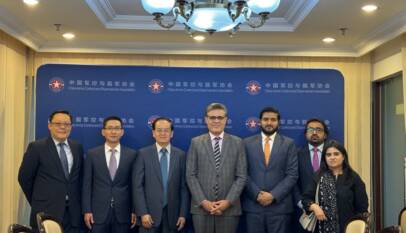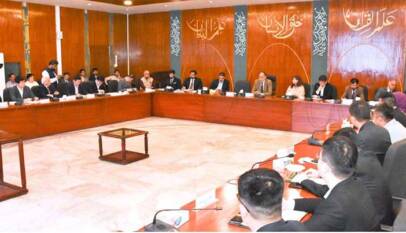Expert lauds Xi Jinping’s efforts in Iran-KSA rapprochement
In an article penned by Mr. Mustafa Hyder Sayed, the Executive Director of the Pakistan-China Institute and a Dongfang Scholar at Peking University, he emphasizes the historical significance of the recent reconciliation between Iran and Saudi Arabia, facilitated by Chinese President Xi Jinping. Unlike past big powers that have exploited the rivalry between the two nations for their own benefit in the Middle East, China’s policy of non-interference has enabled it to gain the trust of both countries. Mr. Sayed also highlights the advantages of this détente, such as improved connectivity for the Belt and Road Initiative, reduced tensions in conflict zones like Yemen, Syria, and Iraq, and economic growth through cooperation and industrialization. He contends that China’s elevated status in the Middle East and its achievement in brokering this agreement signify a substantial shift in the global order and a triumph for multilateralism.
The 11th of March, 2023 witnessed an historic rapprochement between the Islamic Republic of Iran and the Kingdom of Saudi Arabia, forged by Chinese President Xi Jinping.
Iran and Saudi Arabia have traditionally been arch-rivals in the Middle East, the former resisting the leadership of Saudi Arabia and the latter containing Iran from expanding the influence it yields beyond its borders in countries such as Lebanon, Syria, Iraq and so forth. Furthermore, Saudi Arabia and the United States had shared geopolitical interests vis-a-vis Iran, and Iran was viewed by the US as a challenger of US interests in the region that were closely tied with Saudi Arabia.
Additionally, Iran’s categorical opposition to Israel and its treatment of Palestinians exacerbated the US’s containment of Iran, as the US’s relationship with Israel has long been considered a core interest of American foreign policy. The geopolitical chasm between Iran and Saudi Arabia led to contests for influence in other countries and regions, with proxy wars that sought to undermine the other’s interests internationally, adding to instability in the Middle East and some parts of Asia.
Historically, big powers fanned the fire between these two Middle East countries, eyeing their interests in the Middle East as ‘zero-sum’. A prime example is that of the Iran-Iraq War that took place from 1980-88, where Iraq under Saddam Hussain invaded Iran and used chemical weapons against Iranian forces, during the invasion Iraq received logistical, financial and political support from the US, UK, France, Italy and even the Soviet Union.
President Xi’s first bilateral state visit, after staying in China for almost three years due to Covid, was to Saudi Arabia, showing a new impetus in the relationship and a new alignment for the Belt and Road Initiative where China vowed to align its foreign policy and economic development priorities with that of Saudi Arabia. The read-out from the December 8, 2022 meeting between President Xi and Prime Minister Mohammad Bin Salman stated: “China takes the development of its relations with Saudi Arabia as a priority in its overall foreign relations, in particular its diplomacy in the Middle East.” The read-out also mentioned “the need to synergize China’s Belt and Road Initiative and Saudi Arabia’s Vision 2030”. Subsequently, Iran’s President Ebrahim Raisi visited Beijing last month, which was seen as a key visit after China had announced a comprehensive Belt and Road energy deal with Iran previously.
The China-brokered Iran-Saudi deal demonstrates China’s new-found stature in the Middle East, viewed by both Iran and Saudi Arabia as being acceptable, without previous ‘excess baggage’ of being involved in the region for its narrow, parochial interests. On the other hand, China has consistently followed the policy of non-interference in its foreign policy, and is therefore seen as an ‘above-board player’ that commands the trust and legitimacy of both sides.
The deal also shows that China, under President Xi, has ‘arrived’ on the foreign/policy geopolitical realm. After having achieved poverty alleviation and consistent and rapid economic growth internally, China has cultivated the wherewithal to be able to engage, leverage and create partnerships well outside of its own borders that previously was primarily the domain of the US and its Western partners.
Additionally, from a foreign policy perspective, this shows that China’s policy of non-interference has paid off, and China has gained the leverage to engage in international partnerships with a clean slate, unblemished, whereas the US pales in comparison with its track-record of regime-change, orchestrating coups in other countries, and strong-arming weaker countries to suit it’s interests.
This deal, which is in every way a masterstroke by President Xi, is also a win for multilateralism. The deal shows that there is strong cognizance from all leading countries that international cooperation and dialogue, notwithstanding political differences, is critical to their interests as well as that of the region. It also signifies that the strategy of containment, ‘cold war mentality’, and a ‘zero-sum endgame’ cannot work in the post-pandemic world order.
Emmanuel Macron, president of France, testified to the same phenomenon while speaking to a closed-door meeting with senior French diplomats last year, when he said, “the international order is being upended in a whole new way. It is a transformation of the international order. I must admit that Western hegemony may be coming to an end”, a conversation which was later leaked to the media.
The new detente between Iran and Saudi Arabia will lead to a few things, first of which is connectivity. There will be enhanced connectivity for the Belt and Road Initiative as well as via its flagship project, the China-Pakistan Economic Corridor, as Iran and Saudi Arabia both enjoy a good relationship with Pakistan and can use the CPEC to propel new cooperation forward.
Second, it will lead to stability. The detente will lead to de-escalation in Yemen, Syria, and Iraq which have been facing proxies of both countries fighting each other and leading to a spiral of instability. Third, it will bring a new era for the Middle East to grow economically through cooperation and industrialization, without the yolk of conflict holding it back.
The writer is the executive director of Pakistan-China Institute, Dongfang Scholar at Peking University, and an expert on Pakistan-China relations.
CPEC and Kazakhstan’s vital role in regional trade
The Republic of Kazakhstan has opened doors for the expansion of trade with Pakistan that …













